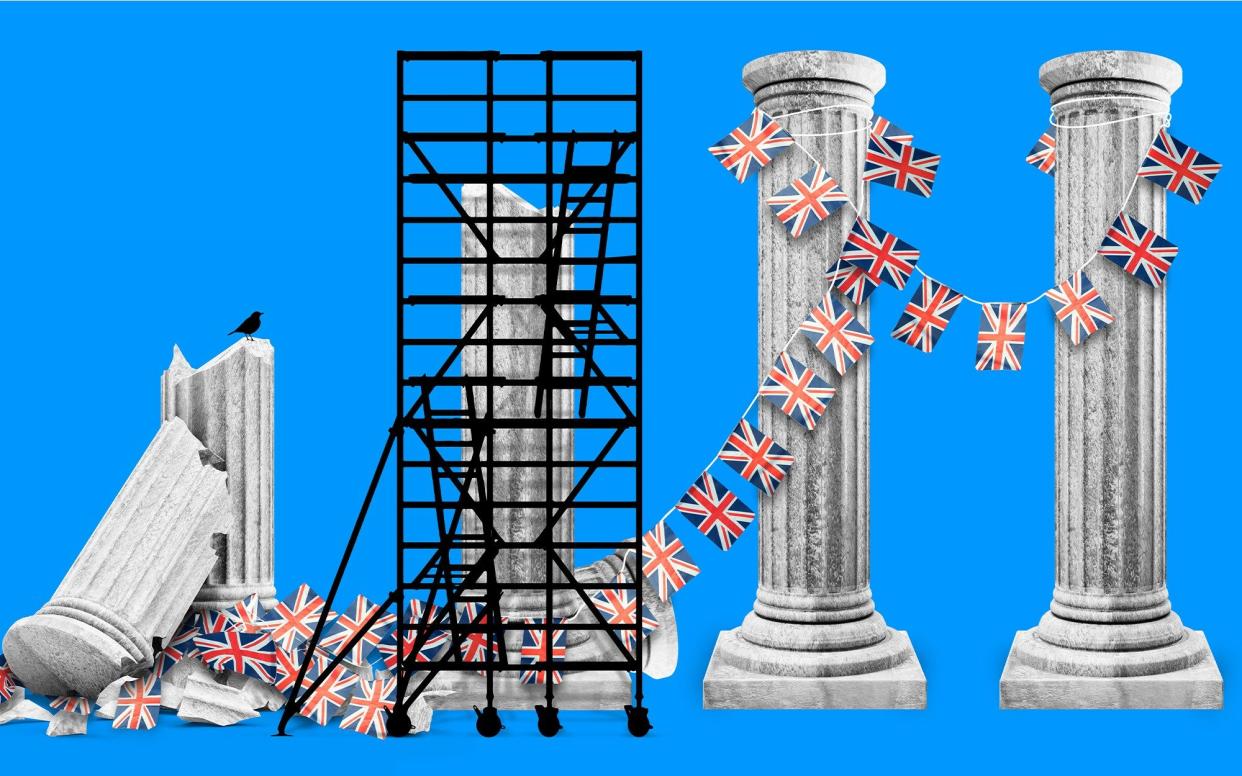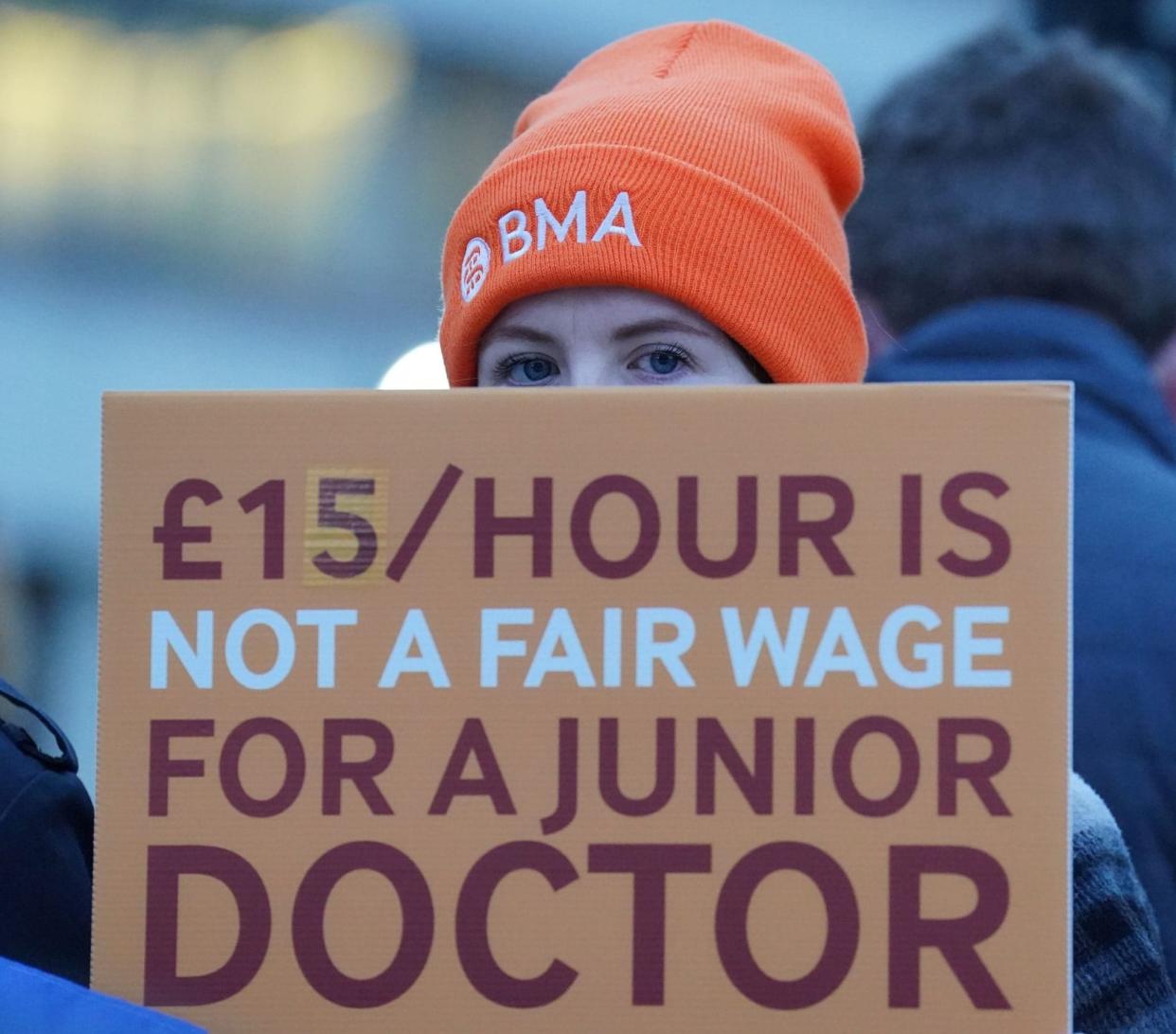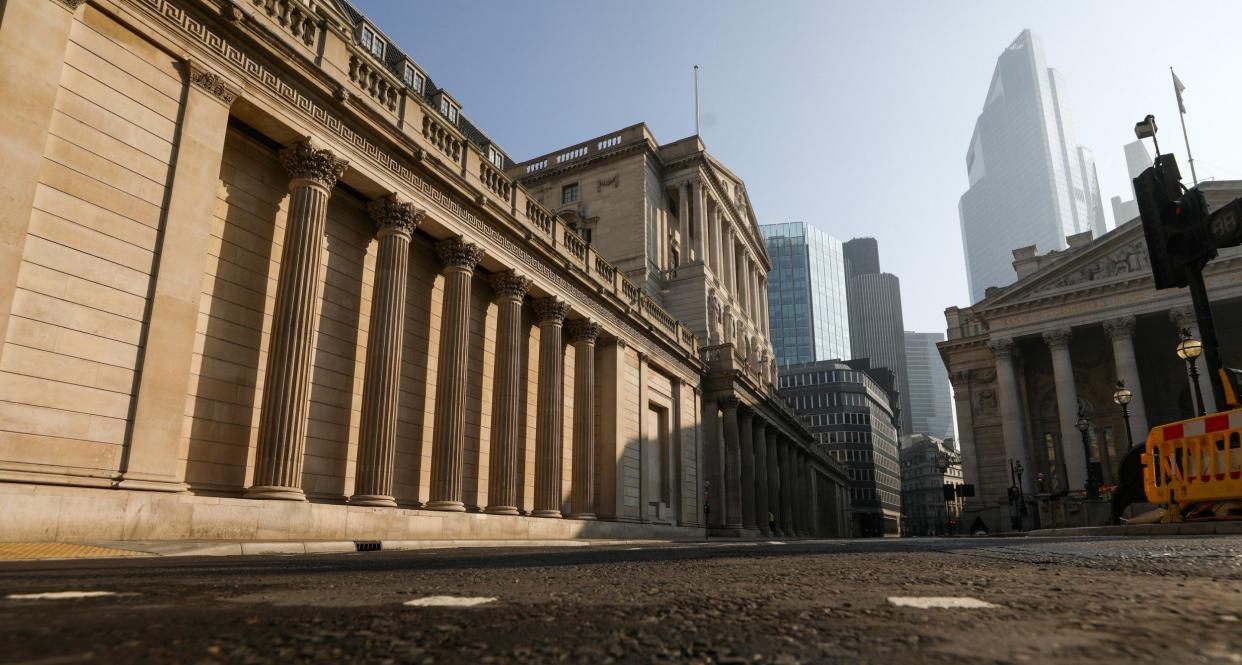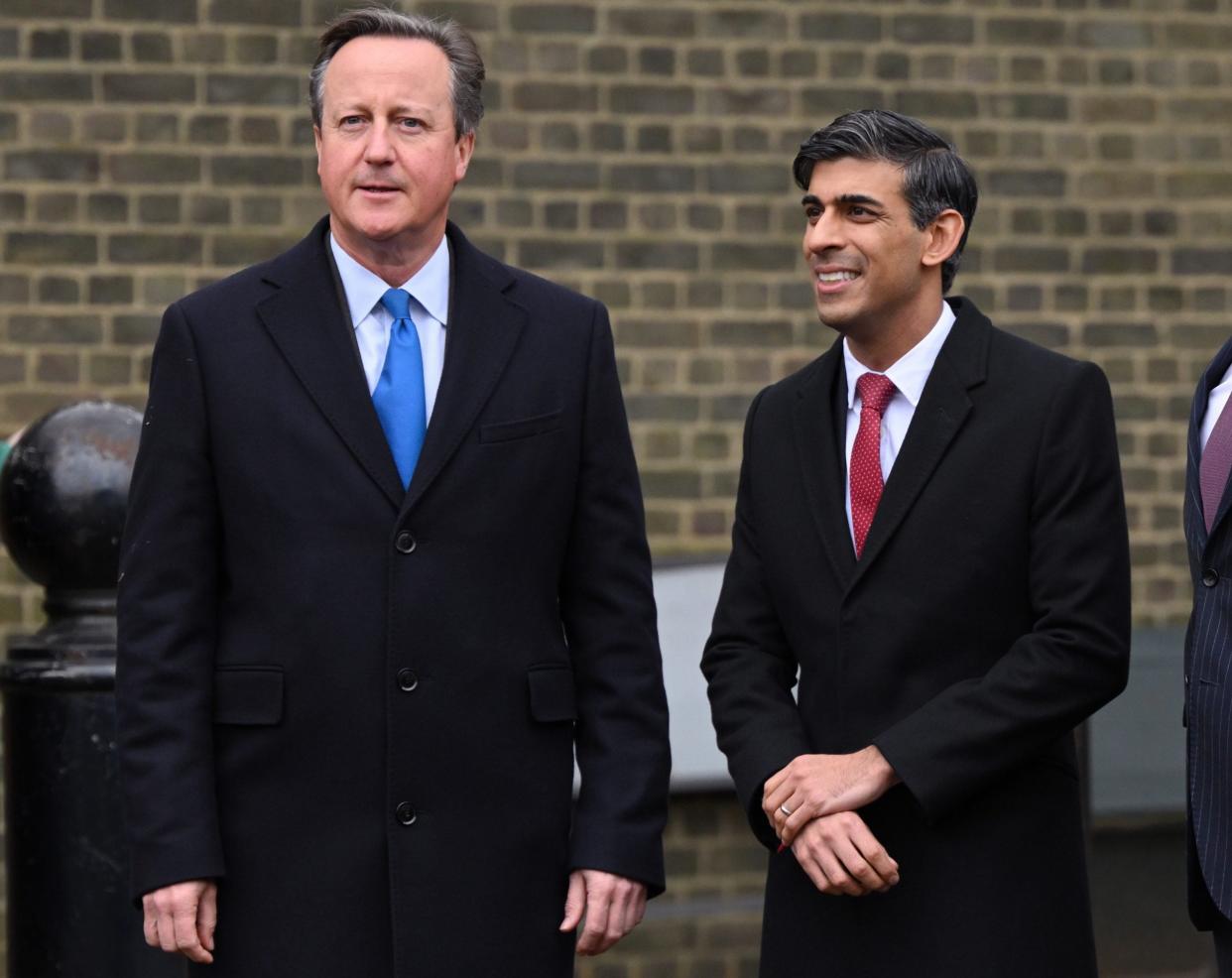Lord Frost: British politics as we know it is broken. Here’s how we Conservatives must rebuild it

Many of us in British politics today sense that an era is coming to an end.
Voters preparing to go to the polls in the upcoming local elections or contemplating where to put their cross in the General Election must do so in an environment where our problems seem intractable, the current ways of dealing with them exhausted, and our party, political, economic, and governmental structures in need of a revamp.
For many there is an echo of the 1970s. There is the same sense of stagnation, the same voter dissatisfaction with the way things are, and, perhaps, the same readiness to contemplate new ways forward.
The work of Sir John Hoskyns for Margaret Thatcher in the late 1970s, while she was Opposition leader, in the so-called Stepping Stones memorandum, makes this similarity obvious.
As he wrote, while in normal times a government could just steer a basically healthy system, “once the system itself starts to show signs of fatigue, instability, [and] disintegration, then… solutions can only be found by breaking constraints which we had assumed were unbreakable”.

He added, famously, that “it is not enough to settle for policies which cannot save us, on the grounds that they are the only ones which are politically possible or administratively convenient”.
Who can disagree that Britain today too shows signs of “fatigue, instability, disintegration”, and must break “constraints which we had assumed were unbreakable”?
Brexit itself was of course such a step, but for many of us the system itself still remains broken, not only not delivering what people want, but actively delivering perverse outcomes that people do not want.
The big contrast between now and the 1970s is that then Britain was an outlier. In contrast, Britain’s problems today are broadly similar to those of much of Western Europe – corporatism, collectivism, declining growth rates, an ageing population – though at least we do not have to live with the dysfunctional and undemocratic governance of those countries unfortunate enough to be locked in to the Eurozone.
The truth is that it is Europe as a whole which is increasingly slipping behind the more dynamic regions of North America and parts of the Asia Pacific.
Hoskyns argued that “what is necessary is a set of interrelated policies which can… nudge the entire social and economic system off the decline course and onto recovery”.
Putting this in place is the overwhelmingly important task for British politicians on the Right today too. That work must face the question: how do we recover the dynamism, ingenuity and determination to prosper that is so evident in other parts of the world?
Answering it requires us to look first at the stresses and challenges the country faces; then at a political programme that might deal with them; and finally at whether the Conservative Party in its existing form is in any way capable of implementing it.
Britain under stress
Britain faces three sets of stresses, not unique to the UK, but taking their own particular form here.
The first is economic. It has many causes: the totemic status of the post-war Attlee government’s legacy, notably the extreme dysfunction of the planning system and the NHS; the over-specialisation and distortion of economic activity around south-east England that ultimately stem from past integration into the EU’s single market; the pernicious consequences of zero interest rates, notably the collapse in productivity; the collectivist mindset resulting from the 2008 crash; growth- and innovation-destroying net-zero policies; the legacy of the lockdowns; the gradual establishment of a benefits culture; and the need for mass immigration as an unsatisfactory palliative for all these strains.
The result has been to extinguish growth per capita, to push up the tax and spending burden, and to turn Britain into an inefficient permanent social democracy in which change is feared rather than welcomed.
The trade union mindset is a brake on reform in the public sector, as we see with the endless NHS strikes and the difficulty in getting civil servants to turn up for work, but the corporatist and rent-seeking mindset is an equal problem in the private sector, as Thames Water’s problems show. This is the economic problem.

The second set of stresses stems from the importation of rigid European-style governance methods into Britain’s informal constitution through EU and ECHR membership: the putative restriction of the traditional concept of parliamentary sovereignty; a higher so-called “supreme” court that purports to be superior to the national legislature; the growth of a set of national laws with semi-constitutional status, notably through the incorporation of the ECHR through the Human Rights Act; a growing belief that international law can have direct effect within the UK; the increasingly intrusive supervision of government actions by the courts; the emergence of a civil service which sees itself not as adviser and implementer, but as a repository of ideological values in its own right; and the creation of devolved regions within the UK and the belief that such regions can in principle secede, a view almost unique in the world.
As a result confidence in the UK’s traditional ways of doing things has waned. Brexit left a vacuum which has not been filled by a reversion to traditional governance. Indeed, many of those who rule us are still mentally in the pre-Brexit world, and lack the confidence or desire to break out from it. This is the governance problem.
The third stress is the gradual replacement of classical Western values with post-modernist “woke” thought, a process which has dramatically accelerated in the last 10 years.
The most visible effects of this so far are the more intrusive constraints on free speech; the decline of the belief in objective truth; the chip on the shoulder about colonialism and Britain’s historical record more broadly; the growth of an actively anti-religious and anti-Christian culture from one that was merely neutral; and the focus on group rights, diversity, and what divides us, rather than individualism, excellence, and national cohesion. Taken all together, this is the values problem.
The solutions
Because these problems are different in nature, they require different solutions.
The economic problem will be best solved by reversing the trend towards collectivism and getting back to markets as the best framework for economic activity.
The global evidence is overwhelming that a free economy is the best way to drive productivity, innovation, growth, income, and wealth. So the government must step back and, as I set out below, concentrate on restoring economic freedom and maintaining a framework within which markets can work.

The governance and values problems are different. Here, the basic underlying difficulty is almost the opposite: not too much state, but too little – the problem of state weakness. The dysfunctional bureaucracy, the failure to deal with corporatism and rent-seeking in the privatised and quango state; the inability to enforce border control and even the decline in belief of its moral necessity, and the undermining of a British national narrative and the moral basis of the British state: all these have weakened the sense, perhaps more so than in any other major Western country, that the United Kingdom is a valid, properly controlled and effectively run nation state with a set of defining values worthy of allegiance.
The solution to this set of problems is re-creating an effective, well-run, state machine that is conscious of its limitations but confident in directing solutions: a civil service that responds to Ministerial directions, a borders agency that can control the borders, police forces that actually control crime, and much more.
The solutions in one area don’t work for the other. A free economy does not require high levels of migration. Nor does it require economic decisions to be taken outside this country by global institutions.
It doesn’t necessitate a belief that all values are equally valid, that history and tradition do not really matter to a country’s success, or that the government should have no role in supporting the family, tried and tested social norms, and some sense of collective national purpose.
Similarly, a strong and effective state is important but can’t substitute for a free market economy. A strong state still can’t know which industries or skills are the right ones to create prosperity in 20 years’ time. It still isn’t better than the private sector in choosing whether to invest in particular sectors or particular geographical areas. It still isn’t any good at running a health system.
What it can be good at is holding the ring, ensuring free competition, and breaking down rent-seeking and corporatism. But it isn’t going to do the private sector’s job better than individuals and business.
What does this mean for the Conservative Party?
The Conservative Party is still the natural vehicle for this programme: a huge new effort to restore free markets and recreate a new sense of nationhood.
But this vision of economic freedom and a limited but effective state needs translating into a political programme, ideally before the upcoming election, but now seemingly more likely in Opposition. Is the Conservative Party up to this task?
The modern Party’s fundamental problem is that it lacks ideological coherence. It is of course true that in the past the Party has always had a range of views on economics, from strong free marketeers to more statist One Nationers.
But until its “modernisation” under David Cameron it always had a centre of gravity based on slowly evolving social conservative values, and, crucially, it was always the party of the nation and its institutions. That is no longer the case.
The centre of gravity began to move, first over Europe, and then over how to respond to the Blair government’s modernisation of Britain’s supposedly “old regime” institutions.

The Party’s own liberalisation then left parts of it easy prey to the wave of post-modern “woke” values that spread fast in the 2010s, with the result that so many of its leading figures gave ground far too easily to the race-baiting of Black Lives Matter or to the madness of thinking men can become women.
Unfortunately, in 2024, an honest look at the modern Party tells you that it no longer represents any coherent set of views on how to solve the country’s economic, government, or values problems.
Policy choice appears to be “pick and mix” – that is, chosen randomly from a menu of possibilities in order to manage Party balance – rather than “tasting menu”, a set of internally consistent policy choices from within a connected and coherent set of propositions.
MPs are disunited and some hold views that can barely be described as Conservative at all. Candidate selection has strengthened all these trends and all the evidence is that the process for the upcoming election is reinforcing it further.
The Conservative Party has been successful, historically, because of its ideological breadth. But it is one thing to be a broad church; it is another to have no guiding philosophy at all. If it is not possible to convincingly describe the kind of society and country that you wish to create, or to deliver any internal consensus on the measures to be taken, then it is inevitable that the electorate will look away.
If the Party is to survive and prosper, it must find its centre of gravity once again and reunite around a set of core principles. And – crucially – it must require its candidates and members to stand by them.
At the moment, members and elected representatives supposedly have to endorse a set of Party objects and values but, incredibly, these are nowhere actually defined. Instead, the only test of Conservatism is loyalty to the Party’s current leadership, a loyalty which has become increasingly fragile and very often unmerited.
Four freedoms for modern Conservatism
I therefore end by setting out a set of core principles for the modern Conservative Party and their policy consequences. The EU has its four founding freedoms, characteristically technocratic ones.
I have four better ones: four political freedoms to help us rebuild the Party and the country. These are: the freedom to govern ourselves; the freedom to create, to protect, and to hand on; the freedom to work and generate wealth; and the freedom to speak freely.
The first freedom is national freedom. It is a prerequisite for the others. It is the right to run our own country in our own way, with our own democratically-elected government and effective state institutions, in pursuit of our own national goals and interests and in the defence of a cohesive and democratic United Kingdom nation state.
We have taken a huge first step by largely restoring self-government in leaving the EU. That job needs to be completed.
But we must also move on by, among other things, modernising the civil service so that Ministers are genuinely in charge; reforming the quango state; getting borders and migration under control and numbers dramatically down by any means necessary, including leaving the ECHR; and having an effective and well-funded defence.
The second freedom is the freedom to transmit: to inherit, to build and create, and to hand on, the freedom that built Western civilisation. Indeed the very existence of our civilisation is a permanent reminder that the state is not essential for achievement.
Everything we think of as our Western inheritance, our art, our culture, our institutions, our nations, our laws, our ideas: almost all of it was created in an era of a tiny state by historical standards.
Rather, it was shaped by individuals who believed that what they did mattered and who were inspired to create and to hand on to the future, within a framework of beliefs fundamentally grounded in a Judeo-Christian conviction about every person’s supreme value and dignity.
Change these convictions and you change society fundamentally. When people have no incentive to build, they stop building. When they can’t hand on what they have done, they stop making it in the first place. They stop caring about the future and become obsessed with ameliorative schemes for the present, and they call the state in to make them happen.
We surely see this as we look around us. Since the state has come to dominate human activity in a big way, broadly since the Second World War, if we honestly look at what we have achieved, are our music, our art, or our architecture, as good as what preceded them?

Aren’t our laws more controlling than ever before? Is our nation really stronger for the weakening of the spirit of self-reliance and the growth of the spirit of looking to the government to do everything important?
That sense of responsibility for a complex civilisation, inherited institutions, tried and tested solutions, the mechanisms that create wealth, prosperity, and beauty, and the freedoms that underpin them all, has always been fundamental to conservatism. It needs to be re-established.
That has some clear policy consequences. Conservatives must set out a programme to reform planning so that every individual can own a house and get the benefits, moral and economic, of being a property owner; change tax policy so it supports rather than undermines the family; reform benefits and universal credit policy so that people have the incentive to work; and abolish inheritance taxes and reform capital taxes so that hard-earned wealth is not handed to the government but used by individuals for the benefit of all.
We will also need to repeal the Equality Act, with its emphasis on group rights and equality of outcome not opportunity, and insist that public money is not used to foster anti-Western and anti-civilisational ideas.
The third freedom is economic freedom, the right to work and to generate wealth, with an explicit focus on economic growth and boosting productivity. These are the forces that have consistently and dramatically improved the lives of individuals since the Industrial Revolution and which have spread aspiration, wealth, and economic power widely in society.
Action here is as much about stopping doing things as about doing things. It means that our government must as far as possible resist the temptation to believe it knows best and to nationalise private decision-making.
It means, to take some recent examples, stopping telling people how they can use their second homes and rented property; not thinking we need a Grand Panjandrum Regulator to run football, one of our most successful industries; and not arbitrarily banning, restricting, or taxing activities like smoking, vaping, alcohol, or even chocolate and cheese.
It also means having a serious competition policy and it means not allowing privatised or quango industries like Water or the Post Office to escape the normal incentives and pressures that govern economic activity.
It means getting tax and spending down; reversing the over-regulation of our labour market; reforming public services like the NHS to remove the dead hand of government; and above all removing the crushing burden of arbitrary Net Zero policy from our energy sector and our productive businesses.
Finally, the fourth freedom is free speech and free debate. Without these things no society can experiment, test ideas, and find the best solutions. Britain used to be the home of free speech. Not any longer. The truth is we increasingly don’t know what we can and can’t say.
We can’t have this in a free society. Repealing the Equality Act would change the culture here too. But ultimately we will need a new free speech law, a Free Speech Act, to roll back the arbitrary constraints of recent years, to sweep away the policing of ideas as well as actions, and to make it clear what can and can’t be said with absolute certainty.
Within living memory, the British people did have full freedom to speak. We have given it away, but we can get it back. We must, for without it we will not long remain a genuinely free society.
Can the Conservative Party redo the work of Sir John Hoskyns and nudge us off decline and into recovery? Can the Party get behind something like these four freedoms to do so?
Undoubtedly some current Party members, MPs, and peers would not be able to sign up to them. But that is part of the solution, not part of the problem. The Party needs to re-establish its ideological coherence and show what it believes in. There will be a price for that – but there will also be a huge gain.
All of us who want to see a political project based on freedom, the nation, and Western civilisational values need to come together to make it happen. Otherwise, the fraying project of British conservatism may continue to unravel painfully and, perhaps, irrevocably in the months and years to come.


